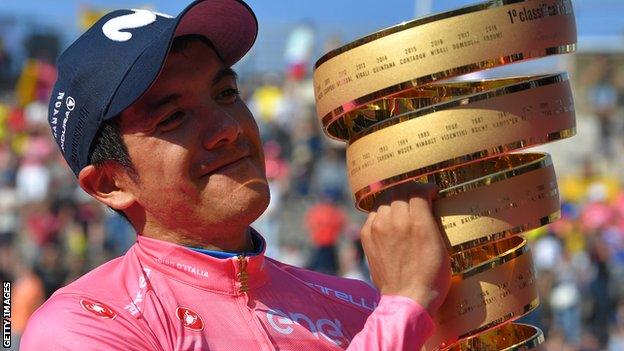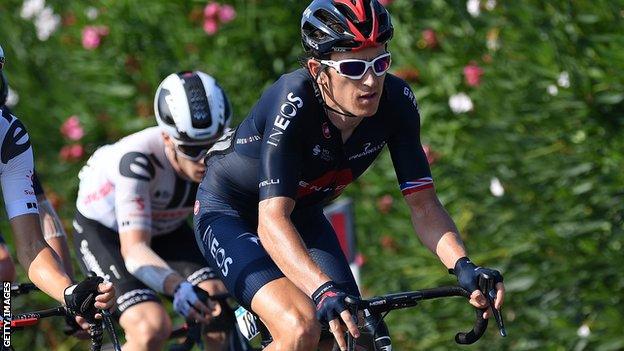Giro d'Italia: Who will challenge and where will the race be won and lost?
- Published

Richard Carapaz won the Giro d'Italia with Movistar last year, but is not part of the Ineos Grenadiers team this year
The Giro d'Italia starts in Sicily on Saturday and takes in 21 stages across 3,497km (2,173 miles) before it concludes in Milan on Sunday 25 October.
With more than 40,000m of climbing and three individual time trials in the rearranged 103rd edition of the race, where will it be won and lost?
BBC Sport looks at which riders are likely to feature in the general classification shake-up and the stages that could define the battle for the maglia rosa.
Saturday 3 October - stage one: Monreale - Palermo 15.1km

The Grande Partenza was originally scheduled to take place in Budapest in May
Saturday's opening time trial includes a steep 1.1km climb up to the centre of Monreale, with the quickest rider at the intermediate time check taking the blue jersey as the first leader of the mountains competition.
From there it's a fast-running descent into the heart of Palermo which will give time-trial specialists - and newly crowned world champion Filippo Ganna - plenty of encouragement.
Monday 5 October - stage three: Enna - Etna, 150km

Mount Etna is the highest active volcano in Europe
The first summit finish of the race should see the general classification battle begin to form. An 18.9km final climb takes the riders up a succession of hairpins as the gradient kicks up from 6% to 11% in the final 1.5km.
Mitchelton-Scott will be hoping to replicate their success on the sixth stage at Mount Etna in 2018, when Colombia's Esteban Chaves and Britain's Simon Yates completed a one-two while distancing Thibaut Pinot, Miguel Angel Lopez and Chris Froome.
Saturday 17 October - stage 14: Conegliano - Valdobbiadene, 34.1km

The stage between Conegliano and Valdobbiadene is known as the Prosecco Superiore wine stage
After a mix of hilly and flatter stages suiting the puncheurs and sprinters, the Giro's third weekend begins with its second individual time trial.
The rolling terrain in the Prosecco vineyards of Treviso could be the backdrop for a big day in the overall race. All-rounders like Geraint Thomas, Rohan Dennis and Ilnur Zakarin, plus Steven Kruijswijk, will look to make gains on a route that takes in a category four climb up the Muro di Ca' del Poggio - briefly hitting a gradient of 19% - and ends with a punchy 5.5% slope to the finish.
Thursday 22 October - stage 18: Pinzolo - Laghi di Cancano, 207km

Stage 18 takes the race 2,758m above sea level
A punishing final few stages begins with more than 5,000m of climbing and a summit finish at Madonna di Campiglio on stage 17 before another colossal day of climbing on stage 18.
With 5,400m of altitude packed into four climbs, this is one of two possible queen stages and takes the riders travel over the highest point of the race on the Stelvio Pass.
The first rider at the Stelvio summit wins the Cima Coppi in honour of five-time champion and Italian great Fausto Coppi. With 48 hairpins - and a further 21 on the final climb up to Laghi di Cancano - all the main contenders will be on the limit.
Saturday 24 October - stage 20: Alba - Sestriere, 198km

Fabio Aru took more than two minutes out of race leader Alberto Contador in 2015 at the finish in Sestriere
Back-loaded with major climbs, the penultimate stage sees the race travel over the Colle dell'Agnello - where Kruijswijk crashed in 2016 while leading the race - before briefly heading into France over the Col d'Izoard.
The finish at Sestriere means the riders head back into the thinner air above 2,000m and, with almost 55km of climbing across the day, plenty of tired legs and lungs should ensure big gaps in the peloton develop.
Sunday 25 October - stage 21: Cernusco sul Naviglio - Milano, 15.7km

The home straight (250m) is on 6m wide stone-paved road
After 3,481km of racing the Giro could be decided by a blistering final 15.7km time trial.
While a turnaround on the scale of last month's Tour de France is unlikely given the nature and distance of the course, any small time gaps could still be exploited by the main contenders.
Who are the favourites for the maglia rosa?

Geraint Thomas was 80th when he last finished the Giro in 2012
Geraint Thomas: Well off the pace at the Criterium du Dauphine in August, Britain's Thomas appears hungry and motivated after being omitted from the Ineos Grenadiers team for the Tour de France.
Given Ineos' troubles at the Tour, the Giro represents an opportunity for both to prove a point. A second-place finish at Tirreno-Adriatico and fourth place in the time trial at the World Championships suggest 2018 Tour de France champion Thomas is riding back into form at the right time.
With his capacity to climb and three individual time trials working in his favour, the 34-year-old Welshman will arrive at the Grande Partenza as one of the big favourites.
Simon Yates: Yates will be hoping it is third time lucky at the Giro. The Mitchelton-Scott rider spectacularly cracked on the Colle delle Finestre when leading the race in 2018, to eventually finish 21st. He was eighth the following year.
However, he comes into this year's race having underlined his credentials as a potential winner, finishing third at the Tour de Pologne and winning Tirreno-Adriatico.
Victory in the 2018 Vuelta a Espana proved the Briton has the nous to win a three-week race but, with his time-trialling likely to be a weakness, he may need a solid lead heading into the final stage.
Steven Kruijswijk: Kruijswijk comes to the Giro after missing out on Jumbo-Visma's challenge to win the Tour with a shoulder injury.
Third in the 2019 Tour, the Dutch rider has unfinished business at the Giro, after a crash when leading the 2016 race destroyed his hopes of winning, while an illness 12 months later forced him to withdraw.
A consistent and durable rider, Kruijswijk will be counting on a hard final week in the mountains to crack his rivals.
Vincenzo Nibali: Nibali, arguably has the best pedigree of any rider at the race, having won all of cycling's Grand Tour's in a stellar career.
Now 35, the Italian will have the benefit of Giulio Ciccone supporting him on the Trek-Segafredo team and will hope to find his legs after subdued displays at Tirreno-Adriatico and the Giro dell'Appennino.
Second to Richard Carapaz in 2019, Nibali - nicknamed the Shark - knows how to win here better than most with seven stage successes and two overall race victories.
Jakob Fuglsang: Former mountain biker Fuglsang missed the Tour to concentrate on the Giro and finished a creditable fifth in the road race at the World Championships.
The Dane is likely to be buoyed by the support of Astana team-mates Oscar Rodriguez, Aleksandr Vlasov and Miguel Angel Lopez, who is fresh from a sixth-placed finish at the Tour - where he claimed a superb win on the Col de la Loze.
However, at 35, Fuglsang still has to prove he can compete at the sharp end of a Grand Tour, with only one top-10 finish in his career.